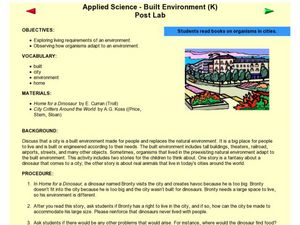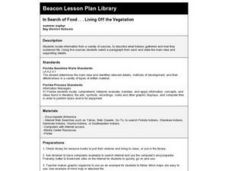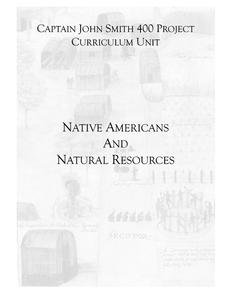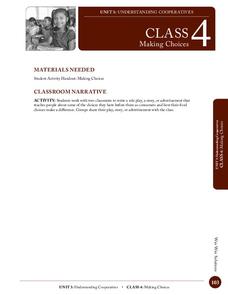Curated OER
Organisms In Cities
Students explore environments and how organisms adapt to the environment. In this science lesson, students read a story and discuss how animals have adapted to changes in their environment.
Curated OER
In Search of Food...Living Off the Vegetation
Fourth graders locate information to describe what Indians gathered and how they sustained life. They use 5 resources, select a paragraph from each and state the main idea and supporting details.
Curated OER
Math, Chemistry, and Food
Students explore the effects of chemical reactions when cooking. Using the Internet, they research enzymes and then mix jello. They examine their results and test enzyme activity by adding pineapple to the jello. Finally, they test...
Science Matters
That’s An Otter Story
Young scientists discover how sea otters' habitats have changed due to human impact. Through conversation, video observation, and story reading, scholars identify how human interactions change a specific ecosystem in both positive and...
National Park Service
Living & Non-Living Interactions
What better way to learn about ecosystems than by getting outside and observing them first hand? Accompanying a field trip to a local park or outdoor space, this series of collaborative activities engages children in...
National Endowment for the Humanities
“Read All About It”: Primary Source Reading in “Chronicling America”
Can investigative journalism become too sensationalistic and accusatory, or is it vital for the survival of a democracy? Middle schoolers analyze primary source documents from early 20th-century newspapers as well as Theodore...
Nuffield Foundation
Microbes Ate My Homework
Now you have a new excuse not to do your homework. A long-term experiment has learners explore cellulose-digesting enzymes. They simulate how paper breaks down in a compost bin. There's no need to blame your dog for eating your homework...
Illinois Department of Natural Resources
Section One: What is Biodiversity?
Four intriguing and scientific activities invite learners to explore the natural resources of their town. The activities cover concepts such as genetic traits, organizing species in a taxonomy, the differences between different species...
MENSA Education & Research Foundation
Ecosystems
Explore the Earth's different ecosystems through four lessons, an assessment, and extension activities. Lessons include informative text and step-by-step instructions to apply knowledge in interactive, and thought provoking ways; such as...
Science Matters
Mighty Microorganisms
How can you tell if a microorganism is helpful or detrimental to an ecosystem? Learners inspect slides or pictures of microorganisms and record their observations to...
Curated OER
Where's the Beef - Beef Facts or Hype, Is it Bad for You?
Analyze a Happy Meal™ for nutrient content and calories. Blend the contents into "McMush" and use Biuret's solution to test for protein content. There are a few problems with the lesson plan: the resource links are no longer...
Curated OER
De"compost"ition
High schoolers develop an understanding of the decomposition process and the parameters which influence the rate at which it occurs.
Curated OER
Gardens Throughout the World
Fourth graders study various aspects of gardens. In this garden lesson plan, 4th graders discover the location of famous gardens on a map. Students research historic gardens.
Curated OER
Artifacts 1: What Can We Learn From Artifacts?
Sixth graders are introduced to artifacts and explore an online archaeological site to connect clues about how people once lived. In this deductive reasoning lesson, 6th graders participate in the stratigraphy game on Kids Dig...
Curated OER
The Chesapeake Bay in Captain John Smith's Time
When Captain John Smith visited the Chesapeake Bay in the summer of 1608, what types of animals and habitats did he encounter? Your young historians will analyze primary source documents to answer this question, as well as compare...
IBM
The Human Body
Every moment, the systems in your body are working together to keep you breathing, standing, and thinking. Elementary schoolers explore the human body and its systems with an impressive, 15-page lesson plan that should leave your...
Curated OER
Native Americans and Natural Resources
North American Indian civilizations had already been in place for over 10,000 years before the arrival of European settlers. Introduce your young historians to Indian tribes that lived in the Chesapeake region in the...
Curated OER
Amphipod Ecology
Students count amphipods under kelp wracks of varying ages to explain how long it takes for them to find their food source. They collect and represent the data.
Curated OER
March Market
Pupils role play a living wetland food web. They trace the food web associated with the items in their lunch.
Curated OER
Plant Life
Seventh graders examine different categories of plant life and their roles as producers of food and oxygen for other organisms. They study the evolution of plants from simple organisms to very complex ones. They look at the different...
National First Ladies' Library
World Starvation
Students investigate the concept of world starvation and some of the organizations that are founded in order to help solve the problem. They conduct research using a variety of resources. The information is used in order to conduct class...
Curated OER
Pheed the World: Edible Phyla
Students discuss the contributions of different organisms to our world. In this biology lesson, students research countries with limited food supply. They create an improvement plan for a fictitious country assigned to them.
Curated OER
Light at the Bottom of the Deep, Dark Ocean?
Students participate in an inquiry activity. They relate the structure of an appendage to its function. They describe how a deepwater organism to its environment without bright light.
Curated OER
Making Choices
Students work with a partner to write a play, story or ad that teaches about our choices as consumers. Students focus on educating people about how food choices make a difference in their lives.
Other popular searches
- Con Pair Organic Foods
- Organic Foods Taste
- Non Organic Foods
- Com Pair Organic Foods
- California Organic Foods
- Compair Organic Foods
- Conpair Organic Foods
- Organic Foods Lesson Plan























